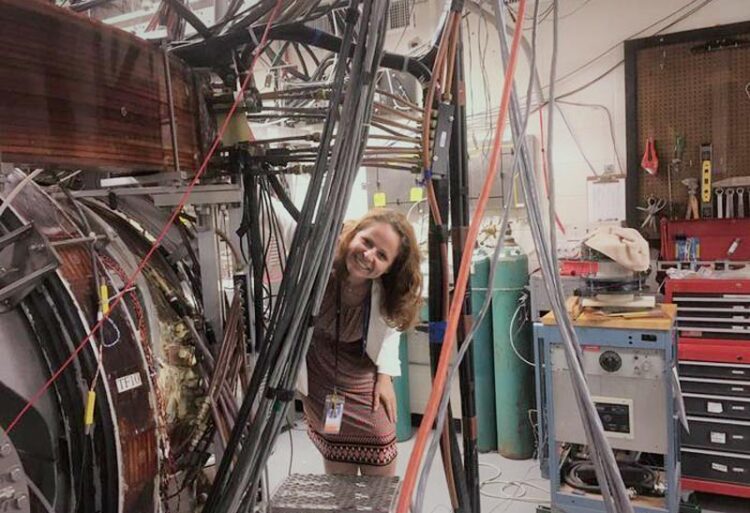FAIR data and inclusive science to enable clean energy

Dr. Evdokiya Kostadinova standing by the Compact Toroidal Hybrid device at the Auburn University's Physics Department.
Photo by: Dr. David Maurer (CTH PI)
Auburn scientists receive a Department of Energy award to accelerate fusion energy research by developing a Findable, Interoperable, Accessible, and Reusable (FAIR) data platform and training a diverse workforce.
Fusion is the process of combining two light atomic nuclei to form a single heavier one while releasing massive amounts of energy. The Sun and all stars are powered through fusion, which makes it the universe’s preferred method of producing energy. Recent breakthroughs in fusion research have led to the US government’s Bold Vision for Commercial Fusion Energy and the remarkable growth of the global fusion industry.
To accelerate the development of fusion-powered reactors on Earth, the US Department of Energy has selected a collaboration among researchers at MIT (as lead), Auburn University, William & Mary, University of Wisconsin-Madison, and the HDF Group to receive close to $5 million in funding. The project will develop a platform where data from different fusion devices, including Auburn’s Compact Toroidal Hybrid (CTH), is managed according to Findable, Interoperable, Accessible, and Reusable (FAIR) standards and UNESCO’s Open Science (OS) recommendations. The data will also be adapted for use with machine learning (ML) tools. The platform’s databases will be built using MDSplusML, an upgraded version of the MDSplus open-source software developed by MIT’s Plasma Science and Fusion Center researchers in the ’80s to catalog the results of the Alcator C-Mod’s experiments. Today, nearly 40 fusion research institutes use MDSplus to store and provide external access to their fusion data. The release of MDSplusML will enable free exchange of data and models across institutions, thus speeding up progress in fusion research.
The Auburn portion of the project is led by Dr. Evdokiya (Eva) Kostadinova, an Assistant Professor in the Physics Department, who specializes in interdisciplinary plasma research. Kostadinova and her students will collaborate with Dr. David Maurer, an Associate Professor in the Physics Department and head of CTH. In Auburn’s CTH experiment, magnetic fields can be shaped in different ways to confine a hot plasma – the state of matter in which fusion reactions occur. Open-sourcing CTH data and adapting it for use with ML tools will allow researchers to explore various concepts for fusion reactors. On the significance of this award, Kostadinova comments, “Fusion research has made remarkable progress, which is evident from multiple exciting results from experiments worldwide. However, true breakthroughs rely on strong collaborations committed to open science and a diversity of viewpoints. This project will enable such collaborations and will allow us to use machine learning to uncover fundamental science hidden in big datasets.”
In addition to being a cross-institutional collaboration between four universities and an industry partner, the project also includes a strong focus on workforce development. With four out of five PIs being women scientists, the team hopes to inspire and encourage diversity in the next generation of fusion scientists. To make this a reality, each year of the project the College of William and Mary will host a summer school where undergraduate students will learn how to employ ML techniques in fusion research. On the role of diverse leadership, the MIT lead, Dr. Cristina Rea, says, “Having the opportunity to lead such an important project is extremely meaningful, and I feel a responsibility to show that women are leaders in STEM. We have an incredible team, strongly motivated to improve our fusion ecosystem and to contribute to making fusion energy a reality.”
All latest news from the category: Physics and Astronomy
This area deals with the fundamental laws and building blocks of nature and how they interact, the properties and the behavior of matter, and research into space and time and their structures.
innovations-report provides in-depth reports and articles on subjects such as astrophysics, laser technologies, nuclear, quantum, particle and solid-state physics, nanotechnologies, planetary research and findings (Mars, Venus) and developments related to the Hubble Telescope.
Newest articles

Properties of new materials for microchips
… can now be measured well. Reseachers of Delft University of Technology demonstrated measuring performance properties of ultrathin silicon membranes. Making ever smaller and more powerful chips requires new ultrathin…

Floating solar’s potential
… to support sustainable development by addressing climate, water, and energy goals holistically. A new study published this week in Nature Energy raises the potential for floating solar photovoltaics (FPV)…

Skyrmions move at record speeds
… a step towards the computing of the future. An international research team led by scientists from the CNRS1 has discovered that the magnetic nanobubbles2 known as skyrmions can be…





















